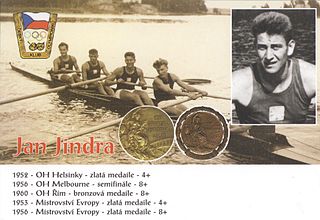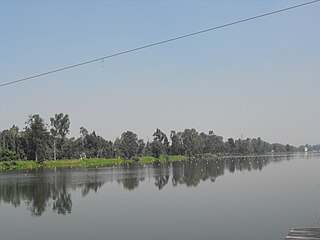
Argentina competed at the 2000 Summer Olympics in Sydney, Australia. 143 competitors, 98 men and 45 women, took part in 98 events in 21 sports.

Venezuela competed at the 1952 Summer Olympics held in Helsinki, Finland. The Venezuelan Olympic Committee selected 38 competitors, 36 men and two women, to take part in 37 events across eight sports. This was a much greater turnout than 1948, Venezuela's only previous entry, which had only one athlete. For the first time, women represented Venezuela at the Summer Olympics. Women have been absent in the Venezuelan team on four occasions, including the next Summer Games held in Melbourne.

Finland competed at the 1948 Summer Olympics in London, England. 129 competitors, 123 men and 6 women, took part in 84 events in 16 sports. As the country hosted the next Olympics in Helsinki, a Finnish segment was performed at the closing ceremony.
The men's individual pursuit was a track cycling event held as part of the Cycling at the 1964 Summer Olympics programme. The course was 4000 metres. It was the first time the event had been held at the Olympics and took place on 16 October and 17 October 1964 at the Hachioji Velodrome. 24 cyclists competed.
The men's team pursuit was a track cycling event held as part of the Cycling at the 1964 Summer Olympics programme. The course was 4000 metres. It was held on 19 October and 21 October 1964 at the Hachioji Velodrome. 18 teams of 4 cyclists each competed.
The men's 100 metres sprint event at the 1948 Olympic Games in London, England, we held at Wembley Stadium on 30 and 31 July. Sixty-three athletes from 33 nations competed; each nation was limited to 3 runners by rules set at the 1930 Olympic Congress. The final was won by American Harrison Dillard, in a photo finish. Lloyd LaBeach of Panama won his nation's first medal in the men's 100 metres, a bronze. This was the first time a photo finish camera was used at an Olympic Games. The photo finish equipment consisted of a photoelectric cell, called the Magic Eye, produced by Swiss watchmaker Omega and a slit photography camera produced by the British Race Finish Recording Company.

The men's 200 metres sprint event at the 1948 Summer Olympics took place between 2 August and 3 August. There were 51 competitors from 28 nations. The maximum number of athletes per nation had been set at 3 since the 1930 Olympic Congress. The final was won by American Mel Patton. His countryman Barney Ewell earned silver, making this the third consecutive Games the United States took the top two spots in the event. Lloyd La Beach's bronze gave Panama a medal in its debut in the event.

The men's 400 metres sprint event at the 1948 Olympic Games took place between August 4 and August 5. Fifty-three athletes from 28 nations competed. The maximum number of athletes per nation had been set at 3 since the 1930 Olympic Congress. The final was won by Jamaican Arthur Wint coming from almost 10 meters back to catch teammate and world record holder Herb McKenley. This was Jamaica's first Olympic gold medal in any event, and broke a string of 3 straight American victories in the men's 400 metres.

The men's 110 metres hurdles event at the 1948 Summer Olympic Games took place on 3 and 4 August. Twenty-eight athletes from 18 nations competed. The maximum number of athletes per nation had been set at 3 since the 1930 Olympic Congress. The final was won by American William Porter. Porter's compatriots, Clyde Scott and Craig Dixon took 2nd and 3rd place. It was the third of nine consecutive American victories, and the ninth overall gold medal for the United States in the 110 metres hurdles. It was also the first of four consecutive American podium sweeps, and the fifth overall sweep by the United States in the event.
The men's 4 × 100 metres relay event at the 1948 Olympic Games took place on August 6 & August 7. The United States team won the final, but was initially disqualified when officials thought the pass between Barney Ewell and Lorenzo Wright had taken place outside the zone. After further review, officials saw that the pass took place inside the zone, and restored U.S. results.

The United States of America (USA) competed at the 2000 Summer Olympics in Sydney, Australia. 586 competitors, 333 men and 253 women, took part in 265 events in 31 sports.

The men's single sculls competition at the 1952 Summer Olympics took place at Meilahti, Helsinki, Finland. The event was held from 20 to 23 July. There were 18 competitors from 18 nations, with each nation limited to a single boat in the event. The event was won by Yuriy Tyukalov of the Soviet Union, in the nation's debut at the Games. Defending champion Mervyn Wood took silver, the fourth medal in five Games for Australia. Teodor Kocerka's bronze was Poland's first medal in the men's single sculls.

The men's sprint cycling event at the 1948 Summer Olympics took place between 7 and 9 August and was one of six events at the 1948 Olympics. There were 23 cyclists from 23 nations, with each nation limited to one competitor. The event was won by Mario Ghella of Italy, the nation's first victory in the men's sprint. Reg Harris of Great Britain, heavily favored coming into the event, finished with silver, the first medal for a British cyclist in the sprint since 1920. Axel Schandorff's bronze was Denmark's first medal in the event since 1928. The podium streaks of the Netherlands and France both ended, with neither nation's cyclist able to advance to the quarterfinals.
The men's tandem cycling event at the 1948 Summer Olympics took place between 7 and 11 August and was one of six events at the 1948 Olympics.

The men's single sculls competition at the 1948 Summer Olympics took place at Henley-on-Thames, London, United Kingdom. The event was held from 5 to 9 August. There were 14 competitors from 14 nations, with each nation limited to a single boat in the event. The event was won by Mervyn Wood of Australia, the nation's third victory in four Games. Eduardo Risso's silver was Uruguay's second medal in the event, after a bronze in 1932. Italy received its first men's single sculls medal with Romolo Catasta's bronze. The United States had its five-Games podium streak in the event ended, as John B. Kelly Jr. lost his semifinal by 0.4 seconds and did not advance to the final.

The men's coxed four competition at the 1956 Summer Olympics took place at Lake Wendouree, Ballarat, Australia. It was held from 23 to 27 November and was won by the team from Italy. There were 10 boats from 10 nations, with each nation limited to a single boat in the event. Italy had previously won this event in 1928, tying Switzerland for second-most wins among nations. Sweden (silver) and Finland (bronze) each won their first medal in the men's coxed four. Switzerland had its three-Games silver-medal streak broken, without a Swiss crew competing.

The men's coxed four competition at the 1952 Summer Olympics took place at Mei Bay, Helsinki, Finland. It was held from 20 to 23 August and was won by the team from Czechoslovakia. There were 17 boats from 17 nations, with each nation limited to a single boat in the event. The gold medal was Czechoslovakia's first medal in the men's coxed four. Switzerland earned its third consecutive silver medal, and sixth medal in seven Games dating back to 1920. The reigning champion United States took bronze.

The men's coxed four competition at the 1968 Summer Olympics took place at Virgilio Uribe Rowing and Canoeing Course, Mexico City, Mexico. It was held from 13 to 19 October and was unexpectedly won by the team from New Zealand, which secured the country its first Olympic rowing gold medal. Thirteen teams from 13 nations attended the competition. East Germany earned its first medal in its debut in the event, taking silver. Switzerland took bronze, its first medal in the men's coxed four since 1952.

The men's coxed pair competition at the 1952 Summer Olympics took place at Meilahti, Finland. It was held from 20 to 23 July. There were 15 boats from 15 nations, with each nation limited to a single boat in the event. The event was won by French team Raymond Salles, Gaston Mercier, and coxswain Bernard Malivoire; it was the nation's first victory in the event. Germany, which had won the event in 1936 but had been excluded from the 1948 Games after World War II, took silver. Sweden, the defending champions, had an all-new crew of Svend Ove Pedersen, Poul Svendsen, and cox Jørgen Frantzen; they took bronze.

The men's eight competition at the 1952 Summer Olympics took place at Meilahti, Finland. It was held from 20 to 23 July. There were 14 boats from 14 nations, with each nation limited to a single boat in the event. The event was won by the United States, the nation's seventh consecutive and ninth overall gold medal in the men's eight; the Americans had won every time they competed. The Soviet Union took silver in its Olympics debut; Australia's bronze was its first medal in the men's eight.












